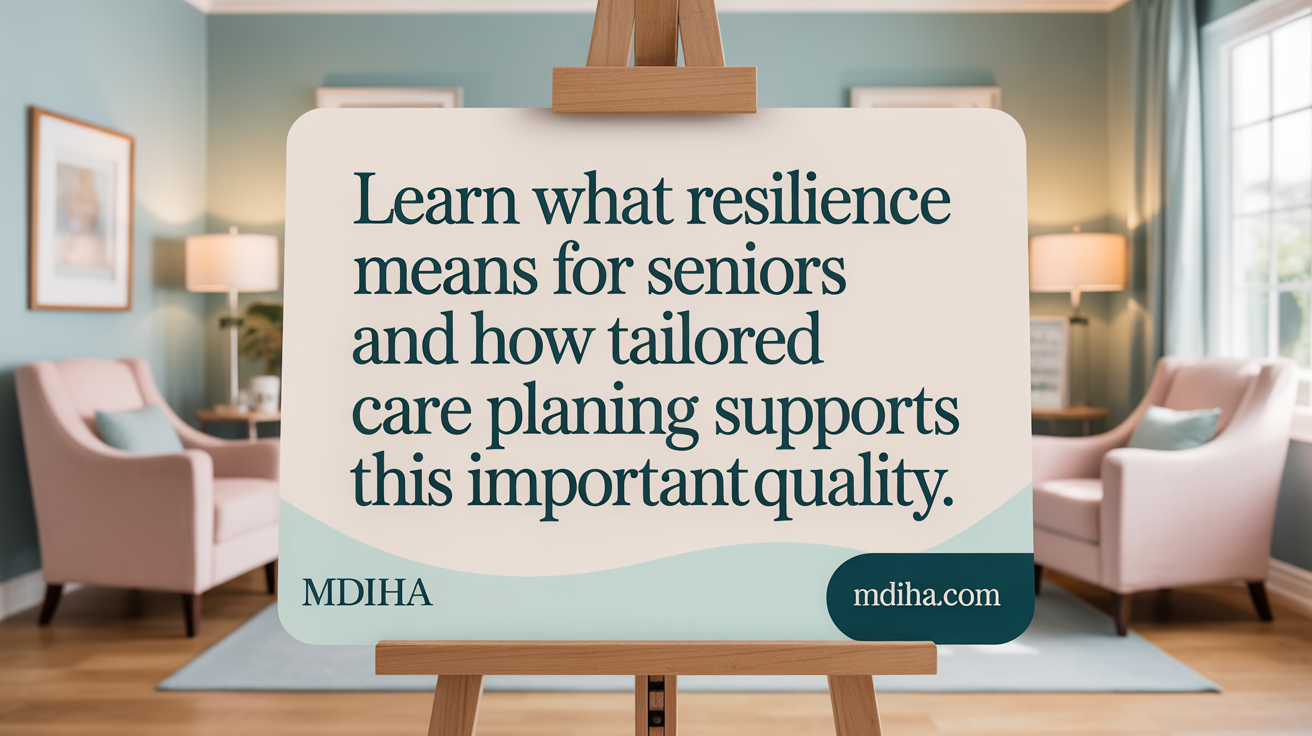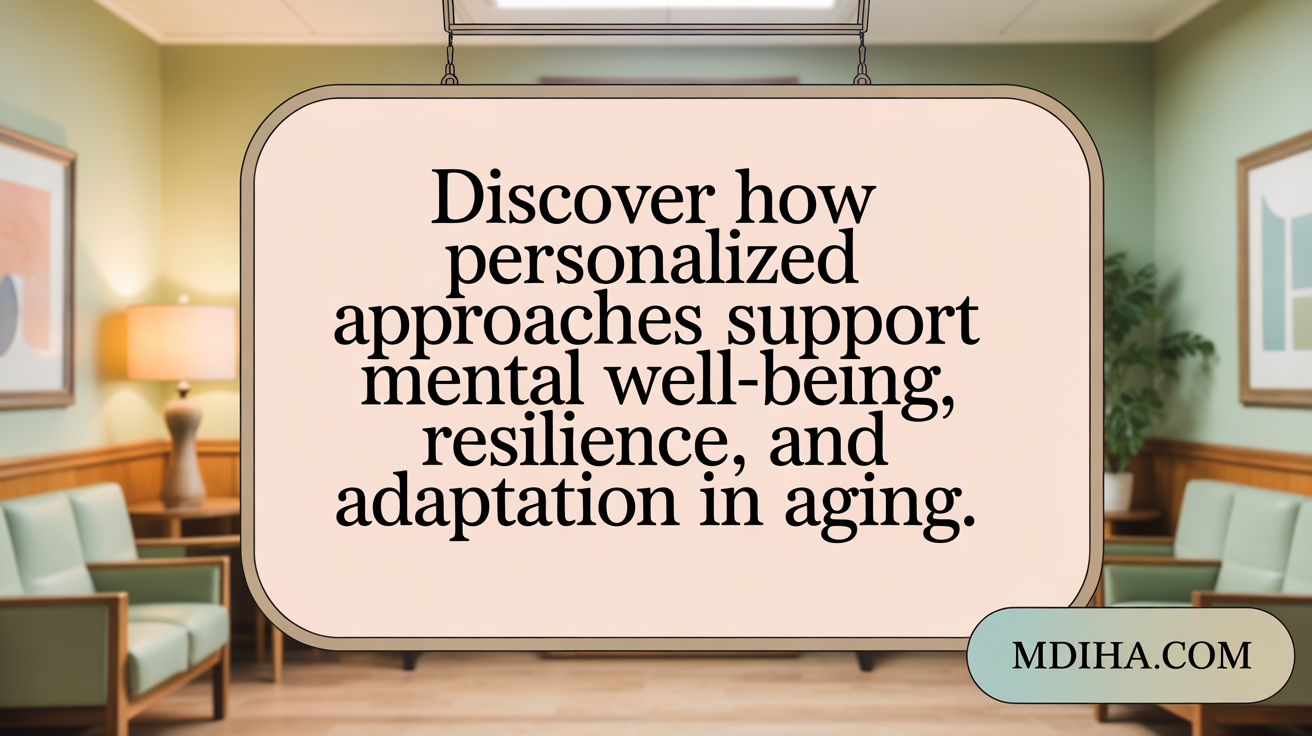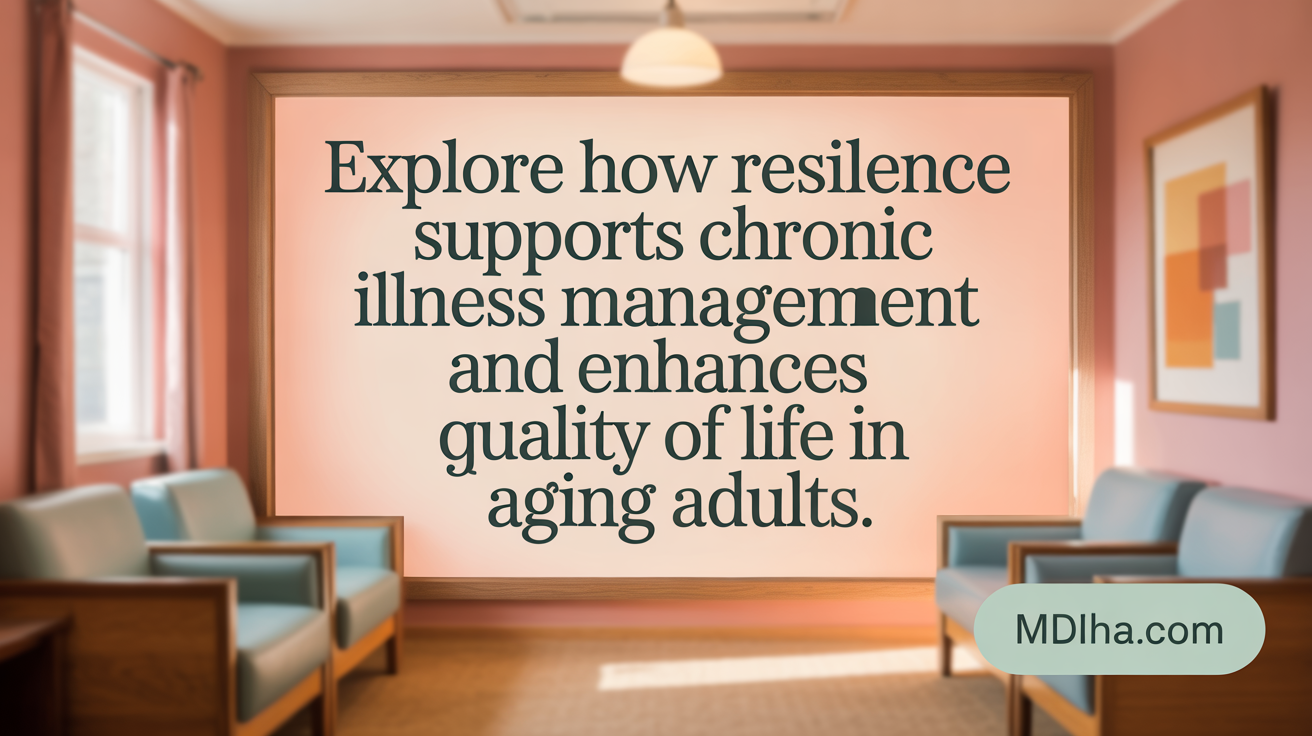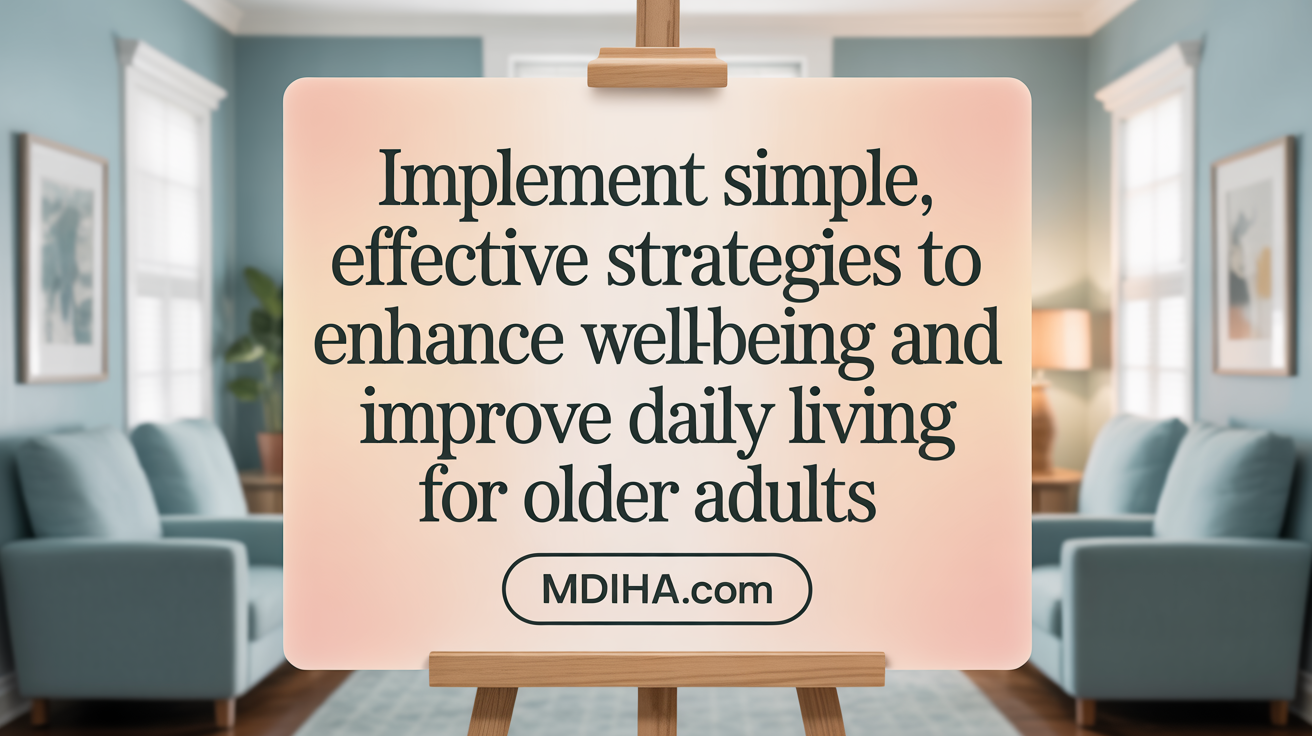Understanding the Power of Personalized Care in Aging
As the global population ages, the focus on not just longevity but quality of life intensifies. Personalized care plans have emerged as a vital tool in supporting older adults to age with dignity, independence, and robust resilience. This article explores how tailored healthcare strategies nurture resilience, enhance mental health, and promote successful aging, ultimately empowering seniors to navigate the complexities of aging with confidence and vitality.
Defining Resilience in Older Adults and the Role of Care Planning

What is resilience in older adults and how can care planning nurture this quality?
Resilience in older adults refers to their ability to adapt positively and rebound after experiencing adversity, such as health setbacks, loss, or social challenges. It involves utilizing a combination of internal strengths and external resources. Internally, attributes like self-awareness, emotional regulation, hope, and optimism help individuals cope effectively. Externally, social support networks, cultural assets, spiritual practices, and good physical health play vital roles.
Building resilience isn’t solely an inherent trait; it can be cultivated through targeted approaches. Personalized care plans are instrumental in this process. They evaluate individual health conditions, social circumstances, and personal preferences to develop strategies that strengthen existing resources and foster new resilience factors.
Care plans tailored for resilience include activities such as social engagement, mental health support, physical exercise, and spiritual participation. These efforts promote emotional well-being, foster social connections, and enhance physical functioning—all crucial for resilience.
In addition, incorporating assessments of resilience helps healthcare providers identify an older adult’s strengths and areas needing support. This proactive approach encourages independence and a sense of purpose, which are essential for thriving amid life's challenges.
Ultimately, holistic, personalized care strategies enable seniors to manage stress more effectively, recover from setbacks, and maintain quality of life, exemplifying the dynamic and learnable nature of resilience in aging.
Key Components and Strategies in Personalized Care Promoting Resilience
What components and strategies are involved in personalized care tailored to promote resilience in aging individuals?
Personalized care designed to foster resilience in older adults involves a thorough understanding and assessment of multiple aspects of an individual's life and environment. This includes evaluating physical health, cognitive function, emotional well-being, social connections, spiritual beliefs, cultural preferences, and home safety.
The assessment process ensures a comprehensive view of the senior's needs, resources, and personal values. It enables care providers to develop tailored interventions that cover medical management, physical activity, nutrition, emotional support, and opportunities for social engagement.
A collaborative approach is central to effective care planning. Active participation of seniors, their family members, healthcare professionals, and faith leaders helps align the plan with the individual's preferences and life goals. This teamwork ensures that care is respectful, holistic, and adaptable.
Safety evaluations are also crucial. By assessing home environments and potential hazards, caregivers can implement modifications that prevent falls and injuries, thereby supporting independence.
To strengthen resilience, strategies focus on empowering seniors. Encouraging autonomy through involve them in decision-making helps maintain dignity and self-efficacy. Promoting positive behaviors such as optimism, problem-solving, and social connectedness enhances their ability to adapt to challenges.
These care frameworks include regular reassessments to adapt the plan as needs evolve, use of technology for monitoring and communication, and targeted interventions that bolster emotional stability and physical health. Collectively, these components and strategies form a comprehensive approach that promotes active, healthy aging while building the resilience necessary to navigate life’s adversities.
Personalized Care Plans — A Holistic Approach Benefitting Health, Emotional Well-being, Independence, and Safety
What are the benefits of personalized care plans for the health, emotional well-being, independence, and safety of seniors?
Personalized care plans are crucial in providing holistic support for seniors, addressing their individual needs across several aspects of life. By tailoring interventions to each person, these plans significantly improve physical and mental health outcomes. Customized treatments, medications, and therapies help reduce health risks and prevent complications, promoting better overall health.
Beyond physical health, personalized plans support emotional well-being by facilitating social connections, engaging seniors in hobbies, and respecting spiritual needs. This not only fosters emotional resilience but also combats loneliness and social isolation.
One of the most important benefits is enhancing independence. Care plans involve seniors in decision-making processes, honoring their routines, preferences, and personal goals. This empowerment maintains their dignity, self-esteem, and sense of control over their lives.
Safety is a key component as well. Environmental modifications, fall prevention strategies, and continuous health monitoring create safer living circumstances. Regular reassessments ensure care remains aligned with evolving needs, preventing harm and encouraging active living.
Overall, personalized care plans contribute to a better quality of life by strengthening relationships with caregivers, supporting mental and physical health, and enabling seniors to live more independent, fulfilling lives. These approaches exemplify compassionate and effective eldercare, fostering well-being on all levels.
Supporting Mental Health, Adaptability, and Coping Skills Through Individualized Care

How does personalized care support mental health, adaptability, and coping skills during aging?
Personalized care plays a crucial role in maintaining and enhancing mental health as individuals age. By tailoring interventions to each senior’s unique needs, preferences, and evolving health conditions, this approach fosters a sense of control and engagement.
Targeted strategies such as psychoeducation, counseling, and early mental health interventions are incorporated into personalized care plans. These efforts help reduce stigma associated with mental health issues, encourage treatment adherence, and promote resilience.
Adjustments are made regularly within the care plan to reflect changing circumstances, supporting adaptability. Involving seniors in shared decision-making empowers them, helping overcome barriers to treatment and ensuring the care remains relevant.
Furthermore, personalized care emphasizes social connectedness and emotional involvement. Facilitating relationships through community activities, spiritual support, or family engagement reduces loneliness and enhances emotional well-being.
This approach not only improves health outcomes but also increases satisfaction, allowing older adults to better manage the challenges associated with aging. Overall, individualized care strengthens coping skills, promotes psychological resilience, and encourages autonomy, leading to healthier and more fulfilling aging experiences.
Linking Tailored Healthcare Strategies to Successful Aging Outcomes
What is the relationship between tailored healthcare strategies and successful aging outcomes?
Personalized, comprehensive healthcare approaches play a vital role in supporting successful aging. These strategies focus on understanding each individual’s unique health, emotional, social, spiritual, and cultural needs. By doing so, healthcare providers can develop holistic, person-centered plans that promote physical health, cognitive function, emotional well-being, and social engagement.
A central aspect of such care involves shared decision-making and motivational interviewing, techniques that foster trust, respect, and autonomy. When older adults actively participate in their own care, they are more likely to adhere to treatment plans and feel empowered, which enhances their overall quality of life.
Successful aging is increasingly viewed as a multidimensional process, encompassing not only physical health but also cognitive vitality, social connections, and emotional resilience. Tailored care supports each of these domains by aligning interventions with the older adult’s personal goals, values, and preferences.
Cultural considerations are also crucial. Recognizing individual and cultural differences ensures that care respects personal beliefs and practices, making health strategies more acceptable and effective.
By promoting active engagement, autonomy, and trust, personalized healthcare approaches help older adults adapt to changing health circumstances. This adaptability is essential for maintaining independence and a sense of purpose.
In summary, customized, holistic care strategies directly influence successful aging outcomes. They foster positive health behaviors, improve adherence, and build resilience, ultimately enabling seniors to live healthier, more fulfilling lives.
Best Practices in Developing and Implementing Personalized Care Plans to Enhance Resilience
What are best practices for developing and implementing personalized care plans to enhance resilience in older adults?
Creating effective personalized care plans for older adults involves a holistic approach that starts with thorough assessments. This process includes evaluating physical health, cognitive and emotional well-being, spiritual preferences, social connections, and home safety. Involving seniors themselves and their families ensures that the plan aligns with their individual values, cultural considerations, and daily routines.
Integrating resilience-building activities is a core component. These activities focus on fostering meaningful social connections, promoting wellness through self-care and mindfulness practices, and encouraging positive thinking, such as maintaining hope, gratitude, and perspective. Supporting older adults in setting personal goals or engaging in community involvement helps them find purpose, further strengthening their capacity to adapt.
Regular review and adaptation of care plans are essential to keep pace with the evolving needs of seniors. These reassessments allow adjustments to interventions and resources, ensuring ongoing relevance and effectiveness.
Providing access to professional support, including healthcare providers, mental health therapists, and faith leaders, helps address barriers and enhances skills necessary for resilience. Such support fosters a network of resources that reinforces coping strategies.
Embedding resilience-focused strategies within a collaborative environment—where healthcare professionals, caregivers, and community members work together—promotes continuous learning and shared responsibility. Encouraging older adults to participate in resilience training programs and experiential activities builds their confidence in managing adversity.
By adopting these best practices, care providers can create tailored strategies that not only address immediate health concerns but also empower older adults to thrive physically, emotionally, and socially, leading to improved quality of life and greater independence.
Enhancing Autonomy and Quality of Life Through Personalized Care

How does personalized care impact autonomy and quality of life in old age?
Personalized care plans play an essential role in empowering older adults by fostering independence and improving their overall well-being. These tailored approaches enable seniors to make informed decisions about their health and daily routines, which is fundamental to preserving their autonomy.
By involving seniors in goal setting and care decision processes, personalized plans respect their preferences, values, and life experiences. This collaborative approach not only enhances their sense of control but also supports emotional security and dignity.
Integrating modern technology, such as remote health monitoring devices, mobile apps, and telehealth services, further bolsters self-management. These tools help older adults track vital health indicators, manage medications, and communicate with healthcare providers easily from their homes, reducing the need for frequent hospital visits and allowing longer stays in familiar environments.
Social integration remains a critical aspect of personalized care. Families, community groups, and caregivers work together to strengthen social bonds, which helps to combat loneliness and social isolation. Maintaining active social connections is linked to better mental health and emotional resilience.
Ultimately, personalized care enhances physical health through tailored medical interventions, supports emotional and social stability by fostering meaningful relationships, and promotes a sense of purpose. These combined effects significantly uplift the quality of life, making aging a more positive and dignified experience for seniors.
| Aspect | Benefits | Supporting Elements |
|---|---|---|
| Informed decision-making | Greater independence, self-esteem | Collaborative planning, senior involvement |
| Use of technology | Better self-management, safety | Remote monitoring, health apps, telehealth |
| Social and community links | Reduced loneliness, enhanced mood | Family engagement, community activities |
| Emotional dignity | Respect, security, psychological well-being | Respectful communication, spiritual support |
| Overall well-being | Improved physical, emotional, social health | Holistic approach, continuous reassessment |
Research indicates that integrating personalized care strategies enhances resilience, allowing older adults to adapt better to health changes and social challenges. Building resilience through such tailored support fosters a thriving, independent aging process, ultimately resulting in a fulfilling quality of life.
The Crucial Link Between Resilience-Building and Chronic Illness Management in Aging

What is the connection between resilience-building and management of chronic illnesses in aging populations?
Resilience plays a central role in how older adults cope with, adapt to, and manage chronic health conditions. Building resilience involves enhancing psychological, social, and spiritual resources—such as hope, support networks, and faith—that empower seniors to face ongoing health challenges effectively. These resources foster positive behaviors like proactive self-care, medication adherence, and seeking social or professional help.
Resilience encourages a positive reinterpretation of health setbacks, helping individuals see difficulties as manageable or as opportunities for growth. This mastery over illness reduces feelings of helplessness and supports emotional stability. Moreover, resilient individuals tend to engage in healthier lifestyles, which can slow disease progression and improve overall wellbeing.
Interventions aimed at strengthening resilience—such as social support programs, spiritual practices, physical activity, and educational initiatives—are proven to improve health behaviors. They facilitate better disease control, reduce hospitalizations, and promote independence in aging.
In essence, resilience acts as a mediator that enables older adults to navigate the complexities of chronic conditions with a sense of mastery, thereby maintaining a higher quality of life and advancing healthier aging processes. Its development is crucial in fostering adaptive responses and sustaining both mental and physical health among seniors facing long-term illnesses.
Building Everyday Resilience: Practical Strategies for Older Adults

What are effective strategies for building resilience in older adults?
Building resilience in older adults is essential for promoting successful aging and maintaining mental and physical health despite facing age-related challenges. Several practical approaches can help strengthen resilience and improve quality of life.
One of the most effective strategies is fostering social connections. Maintaining strong, supportive relationships with family, friends, and community groups provides emotional resources and a sense of belonging. Participating in social activities, community events, or support groups helps combat feelings of loneliness and isolation, which are common in later life.
Encouraging physical activity and engagement in hobbies is another vital approach. Regular exercise, whether through walking, dancing, or tailored fitness classes, enhances physical health and boosts mood. Additionally, engaging in hobbies like gardening, arts and crafts, or volunteer work fosters a sense of purpose and achievement, contributing to psychological resilience.
Promoting positive thinking and mindfulness involves cultivating optimism and emotional awareness. Techniques such as mindfulness meditation or cognitive-behavioral strategies help older adults maintain a hopeful outlook and manage stress effectively. These practices encourage staying present, accepting age-related changes gracefully, and developing adaptive attitudes during adversity.
Developing coping skills and stress management routines is also crucial. Establishing regular routines for relaxation, deep breathing exercises, or talking with trusted individuals can improve emotional regulation. Learning effective communication and problem-solving skills equips older adults to respond resiliently to challenges like health issues or personal losses.
Lastly, supporting purposeful activities and spiritual well-being plays a significant role. Engaging in activities that provide a sense of meaning, whether through religious worship, reflection, or community service, reinforces resilience. Spiritual engagement offers comfort, hope, and strength when facing difficulties.
Incorporating these strategies into daily life can empower older adults to navigate life's changes with confidence and a sense of purpose. Building resilience is a dynamic process that can be cultivated through consistent effort, social support, and positive habits, ultimately fostering healthier and more fulfilling aging.
The Path Forward: Embracing Personalized Care for Resilient Aging
Personalized care plans represent a cornerstone for fostering resilience and promoting successful aging in a rapidly growing older population. By addressing the multifaceted and evolving needs of seniors through holistic, individualized approaches, these plans empower older adults to maintain autonomy, adapt to life’s challenges, and sustain their mental and physical well-being. Through collaborative development and continuous adaptation, personalized care not only enhances health outcomes and quality of life but also builds a foundation of resilience that enables seniors to thrive despite adversity. As research and practice continue to evolve, embracing personalized, resilience-focused care promises a future where aging is not just about adding years to life, but adding life to years.
References
- The Power of Personalized Care Plans for Seniors Aging at Home
- Resilience in Older People: A Concept Analysis - PMC
- The Psychology of Aging and Its Impact on Care Planning
- [PDF] Resilience in Aging - ELDER CARE - The University of Arizona
- Resiliency as we age | To Your Health | Illinois Extension | UIUC
- The Importance of Personalized Care Plans when Aging in Place
- Resilience And Successful Aging - PMC - PubMed Central
- What we can learn from the resilience of older adults - Providence blog
